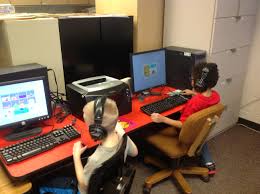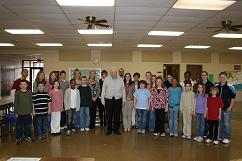Program Description

|
|
S.O.S. provides schools with the fiscal means and a mechanism to address the risk factor of
academic failure in school. Older, more advanced students provide one-on-one, supportive tutoring
in a variety of subjects before and/or after school to younger, academically less proficient
students. Since each school district develops its own protocols that best meet its own unique
needs and resources, the following description covers the range of programs.
|
Tutors are older, more advanced students recruited from designated grades to apply (with
parents permission). Teachers and guidance counselors evaluate applicants on academic performance,
attendance, and behavior. Once chosen, tutors are trained (e.g. learning strategies, study
skills, mentoring). They are also mentored by certified teachers either weekly or after each
tutoring session to give feedback on how to best assess and address their individual tutees needs
and prepare for the next teacher-monitored tutoring session.
|
The student tutors are employed at up to $8 an hour and typically spend two to four hours a week
tutoring. Tutor pay is above minimum wage. This sends a strong message to all students when they
are at an impressionable age, about the value of education and academic achievement.
|

|
Tutees receive valuable one-on-one instructions that they cant get in the classroom.
Depending on how each school organizes their peer tutoring program, tutees are identified by
teachers as at-risk, by parents, by the students themselves, or by team student groups.
Peer tutoring is not intended to replace classroom activities rather it enhances and
makes academic concepts more accessible to students. Peer tutoring is seen as a model of a
cost-effective way (between $60 to $250 per year per student) to improve student performance.
Program funding, for each school district, has two sources: S.O.S. and local funders
(school district, Parents Teacher Associations, community (e.g. Rotary), businesses, and
individual contributions). S.O.S. requires 1:1 matching funds for schools. This encourages
communities to own and adapt the peer tutoring program to meet the needs of their individual
student body and schools. S.O.S. thus funds half of the tutors pay and if needed, half the
wages paid to the schools coordinator and/or teacher monitors. Under special circumstances,
S.O.S. may also partially or fully cover pre- and after-school transportation for tutees and
tutors.
Leveraging funds occurs, as communities, upon seeing the positive impact the program has on
students, tend to surpass the 1:1 match requirement. For example, in 2002-2003 the Carbon
Cliff/Barstow school district received $4,000 from S.O.S. and the community provided $19,339;
in 2003-2004, Perrysburg provided $8,125 and S.O.S. gave $5,000. S.O.S. funds generate community
enthusiasm and monetary support, creating more involvement in public schools and money spent on
education. Since much of the administrative work for these programs is handled by Cauffiel
Industries, S.O.S. overhead is kept to an absolute minimum.
Evaluation
Each school is required to submit a report that includes an annual evaluation of the program
along with budgetary information. Indicators which schools have used to evaluate the impact
and effectiveness of peer-tutoring are: final grades; behavioral indices; suspension reports
in- an out-of school; attendance logs, performance on standardized tests pre- and post-tutoring;
and evaluations from teachers, students (tutees and tutors), parents, and the school coordinator.
S.O.S. reviews these evaluations and works with the schools to address concerns and to insure
continued success.
Encouraging and Supporting Our Youth

|
|
S.O.S. peer tutoring programs make a difference. A little extra time and attention provides a
world of difference to a struggling student it gives them hope, self-confidence, and a stronger
academic foundation.
|
Tutors and tutees benefit academically and behaviorally. Students learn to provide positive and
negative feedback, improve conflict resolution skills, balance competition and cooperation, and
understand responsibility for themselves and others. Most importantly, both tutors and tutees
find it acceptable to ask for help and share knowledge and that learning and helping someone is
an enjoyable and rewarding experience.
Teachers and administrators use the program to provide the students with academic support that
due school budgets and time restrictions - may not otherwise be provided. Parents and communities
get caught up in the enthusiasm that the students feel about academics and their tutee-tutor
relationships, evoking new support and interest in educational endeavors.
The existence and continued expansion of S.O.S. peer tutoring programs in Ohio and other states
reflects each communities need and interest in taking control of their lives and futures. Given
the demonstrated benefits of S.O.S.s programs, they feel that they can improve the quality of
education and expand the academic and social opportunities. Diverse elements of the community pull
together to support S.O.S. and thus become involved in the public schools. Everyone benefits
from S.O.S. supported peer tutoring programs.
|